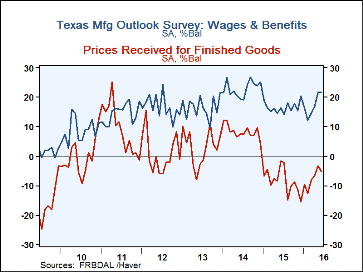 Global| Jun 27 2016
Global| Jun 27 2016Dallas Fed Factory Sector Activity Index Remains Depressed
by:Tom Moeller
|in:Economy in Brief
Summary
The Federal Reserve Bank of Dallas reported that its general activity index of factory sector activity remained negative during June. The index of general business conditions at -18.3 compared to -20.8 in May. The figure has been [...]
The Federal Reserve Bank of Dallas reported that its general activity index of factory sector activity remained negative during June. The index of general business conditions at -18.3 compared to -20.8 in May. The figure has been negative since 2015. The rate of decline has slowed, however, since January's -34.6. Production levels continued on balance to decline, suggested by a reading of -7.0, little changed from -6.4 posted one year ago. Growth in new orders also deteriorated; the reading of -18.6 was the weakest level of the economic expansion. Hiring activity also was under pressure. The employment index of -11.5 was the weakest reading since November 2009. Pricing power continued to suffer due to this continued weakness in business activity. The finished goods prices index eased to -5.2, although improved versus the weakest reading of the cycle (-15.5) six months ago.
Prospects for business activity look to have improved. The reading for six months from now rose to 2.6, its third positive figure this year, although it was down from 17.4 averaged two years ago. The production reading tread water at 27.1, as it has since the beginning of last year. Optimism about the outlook for new orders also was restrained as the index level of 20.3 was in the range of the last 18 months. Caution also showed up in employment prospects where the six month ahead figure of 12.2 mirrored the sideways path of the other future activity readings. Wages & benefits are expected to improve little as a result, and the reading of 31.6 was well below the 43.1 high averaged in 2014.
The diffusion indexes are calculated as the percentage of total respondents reporting increases minus the percentage reporting declines. The data can be found in Haver's SURVEYS database.
Hey, Economist! How Is the Research and Statistics Group Changing? from the Federal Reserve Bank of New York can be found here.
| Dallas Federal Reserve Texas Manufacturing Survey (SA, Percent Balance) | Jun | May | Apr | Jun '15 | 2015 | 2014 | 2013 |
|---|---|---|---|---|---|---|---|
| General Business Activity Versus One Month Ago | -18.3 | -20.8 | -13.9 | -7.3 | -12.5 | 8.3 | 2.2 |
| Production | -7.0 | -13.1 | 5.8 | -6.4 | -1.0 | 14.5 | 9.8 |
| Growth Rate of New Orders | -18.6 | -14.7 | -0.7 | -15.3 | -11.8 | 4.7 | 0.1 |
| Number of Employees | -11.5 | -6.7 | -3.7 | -3.2 | -0.4 | 11.5 | 5.7 |
| Prices Received for Finished Goods | -5.2 | -3.3 | -6.6 | -1.5 | -8.5 | 8.3 | 2.9 |
| Business Activity in Six Months | 2.6 | -1.8 | 0.4 | 8.0 | 4.1 | 17.4 | 11.0 |
| Production | 27.1 | 24.6 | 33.9 | 35.1 | 31.1 | 42.7 | 37.1 |
| Future New Orders Growth Rate | 20.3 | 10.2 | 22.4 | 21.4 | 20.7 | 31.5 | 25.1 |
| Number of Employees | 12.2 | 2.7 | 9.4 | 16.4 | 14.6 | 28.6 | 23.1 |
| Wages & Benefits | 31.6 | 31.4 | 33.8 | 31.0 | 33.2 | 43.1 | 38.2 |
Tom Moeller
AuthorMore in Author Profile »Prior to joining Haver Analytics in 2000, Mr. Moeller worked as the Economist at Chancellor Capital Management from 1985 to 1999. There, he developed comprehensive economic forecasts and interpreted economic data for equity and fixed income portfolio managers. Also at Chancellor, Mr. Moeller worked as an equity analyst and was responsible for researching and rating companies in the economically sensitive automobile and housing industries for investment in Chancellor’s equity portfolio. Prior to joining Chancellor, Mr. Moeller was an Economist at Citibank from 1979 to 1984. He also analyzed pricing behavior in the metals industry for the Council on Wage and Price Stability in Washington, D.C. In 1999, Mr. Moeller received the award for most accurate forecast from the Forecasters' Club of New York. From 1990 to 1992 he was President of the New York Association for Business Economists. Mr. Moeller earned an M.B.A. in Finance from Fordham University, where he graduated in 1987. He holds a Bachelor of Arts in Economics from George Washington University.
More Economy in Brief
 Global| Feb 05 2026
Global| Feb 05 2026Charts of the Week: Balanced Policy, Resilient Data and AI Narratives
by:Andrew Cates










